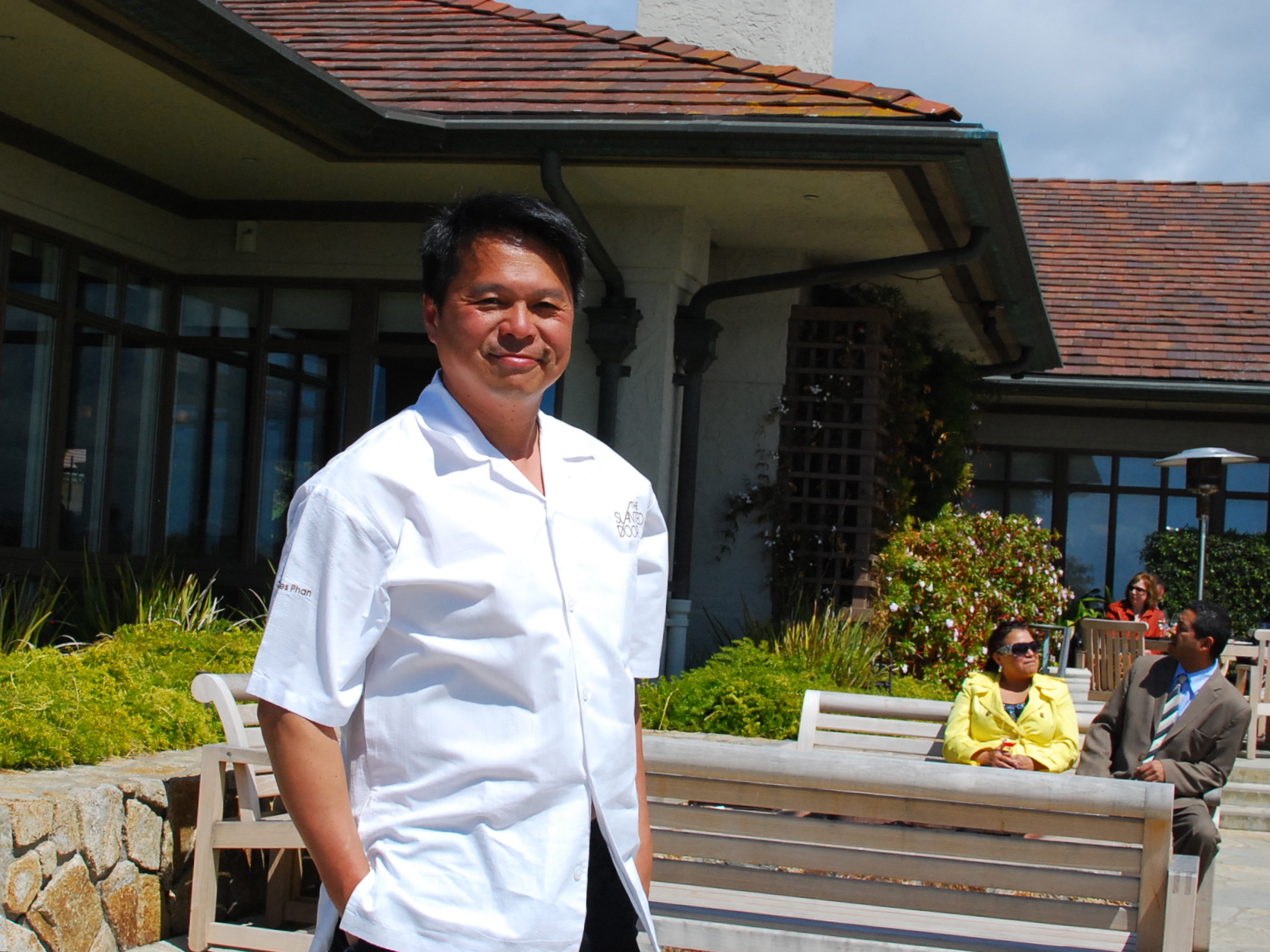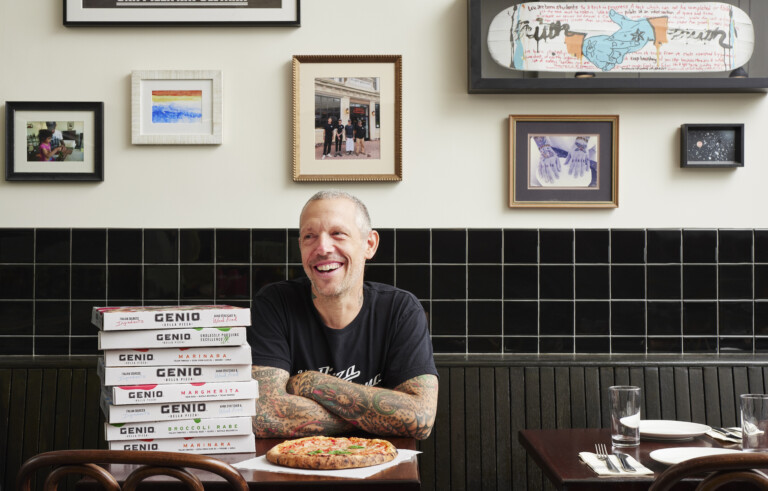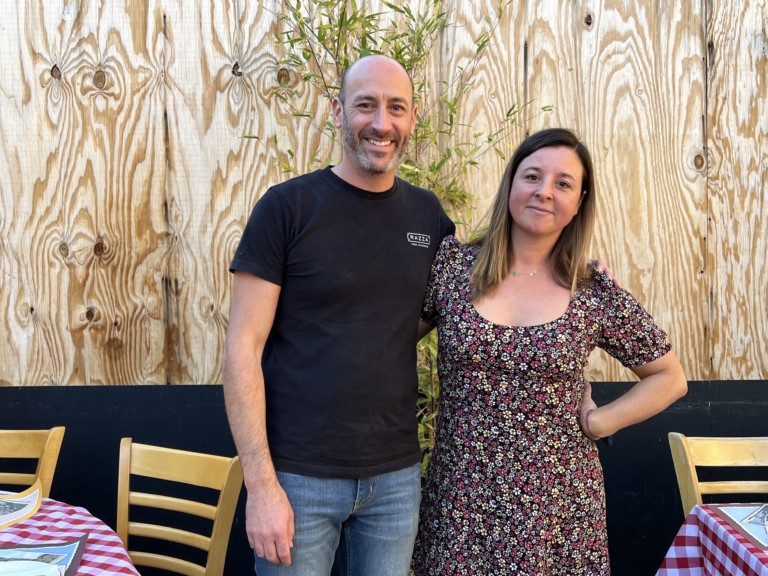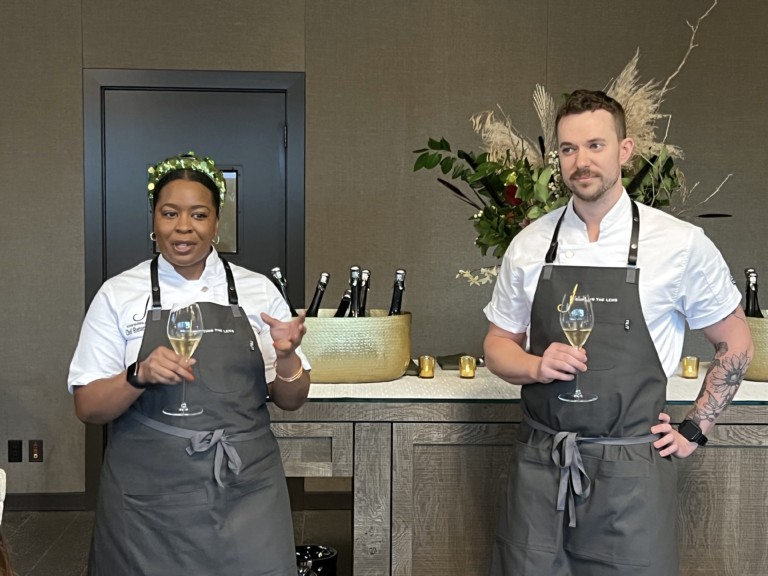I first tasted Charles Phan’s cooking in 1995 at The Slanted Door, a game changing San Francisco restaurant that helped to redirect the Mission’s trajectory. He’s moved his contemporary Vietnamese restaurant twice since then, settling on the culinary Mecca that is the Ferry Building. He’s spun off some more casual branches of the derivative Out The Door, debuted Heaven’s Dog in SoMa, and most recently, added Wo Hing General Store to the mix. He also has another concept in the works for the California Academy of Sciences and if that wasn’t enough, he even wrote a cookbook, Vietnamese Home Cooking, which has a September 25 release date. I spoke with him on April 13 at the Pebble Beach Food & Wine festival. Charles Phan just finished cooking alongside Roy Yamaguchi and Sang Yoon and shared insights that hint at how he’s found culinary success.
Josh Lurie: You were just cooking at an event called Cooking Beyond Fusion. What do you think of when you hear the word fusion?
Charles Phan: I think at one point the word fusion was sort of like a bad word. It’s like the F word, but I think the very essence of Vietnamese cooking is about blending all these different cultures. The Chinese were there for a long time and had over 1000 years influence on Vietnamese cooking. The French were there, and the Malay, and the mountain tribes and the Indian spices. In the ’80s, it sort of had this bad connotation because some of them were not very good at mixing French technique, but I think fusion is going the other way. You see a lot of French chefs using fish sauce, using a lot of Asian ingredients. Every chef inside asked what I put inside my chicken today. Every style of cooking has its foundation, its basis. It’s not right or wrong, it just has its particular aesthetic. I think you see French chefs using Asian ingredients more and more on their menu, and they’re not just incorporating it in a way of making French food, but sometimes they really like that particular technique, and you see parts of it. Fusion, like anything, when you try something new, some works and some doesn’t. I’m sure there are a lot of bad combinations of French and Vietnamese food, but the good one is left behind and it becomes Vietnamese food. Like the Vietnamese sandwich, banh mi, that’s a fusion thing, but you call it a French sandwich? No. Now it’s Vietnamese food because everybody does it so much. It’s a huge success, so everybody has a variation of that sandwich.
Josh Lurie: Was it a given that you’d become a chef, or did you consider other careers?
Charles Phan: No, I wanted to be a potter. I was throwing pot, doing ceramics, I wanted to be an artist, and my dad was furious. I was the first kid to go to college in my lineage. He was upset that I wanted to be a potter, so I studied architecture. It just so happened I started working in a restaurant when I was in high school, throwing pot and saw the business, saw a niche. I like food. I like cooking. So I just had to do this 16 years ago. I learned a lot along the way. And I just saw a certain aesthetic that could be in any environment. But I remember coming here 14 years ago, not at Pebble Beach. It was at Highlands Inn, and I remember we were making this Vietnamese rice paper dumpling, it’s called banh cuon, the entire place stopped…Highlands Inn is like a quarter of this space. And everybody saw we made a drum and were steaming this rice paper. We were peeling it from this drum and we were in the pastry department, and the entire kitchen stopped and looked at it. It just goes to show there’s no boundary in what types of food you can serve at these events. People are looking for good food, innovative food, new places, and everybody has a certain style and they always put me next to Roy [Yamaguchi], and it’s great…I guess you could pair me up with an Italian guy, but I guess it’s better because it’s all Asian. I just noticed we all had rice on our plates today, for three courses. Sang’s got rice on his course. We didn’t even call each other. We didn’t even find out what dress we were going to wear. We’re all wearing the same dress.
Josh Lurie: What’s the biggest challenge of owning and operating multiple restaurants, and how much more can you take on?
Charles Phan: Like any business, you have to deal with paying rent, making money, paying people. A lot of us would love to be an artist and do whatever we want and not worry about food cost, but that’s always a challenge. Also, it’s just a lot of managing people. People are not machines. You don’t just change out new machines when they’re old. You have to change their job, you’ve got to change their challenge, you’ve got to change their pay. Nothing stays the same, which is very similar to me. I like change. I don’t like to do the same thing. A lot of time, people are like, “Oh, I wish you were in the old place.”
Josh Lurie: And now you are [with Wo Hing General Store].
Charles Phan: Yeah, but it’s not realistic. It’s not like some old man in Japan who has a building and cooks the same dish for 50 years. Not everybody gets to do that, or has the bandwidth to do that. So good things come and go. It’s all about change. It’s all about moving forward, bringing something new to the table. Sometimes they like you the first round, but might not like you the second round. It really doesn’t matter. As long as you like what you do, only so many people like you. Not everybody is going to like you, as long as you don’t cross that line of being not honest and not doing something interesting, or making bad food, then people start having doubts about your ability at all your properties. For us, it’s always about making sure we provide good, high quality food at a certain value, and introduce new ideas, new aesthetic.
Josh Lurie: What do you look for when you’re hiring somebody to work in one of your kitchens?
Charles Phan: Well we look for their enthusiasm, their passion, and make sure we’re on the same page, because sometimes some people might have certain ideas about Slanted Door and what kind of place we do, certain expectations. Sometimes we take people with no experience and enthusiasm and it didn’t really matter when we trained them for work, but also some job, we need more experience. It just depends on the job. There’s one thing we have to have, you’ve got to have heart, you’ve got to have passion, and you’ve got to care. The industry’s not one of those industries that pays super well. That’s obvious. We wish we paid more, but the industry has set the standard of pay per hour, and so on, so hopefully we can give you something more than just a paycheck. I wish we could pay people more, but we can’t, so what else can you bring to the staff? Provide them with the knowledge and experience so that they can grow, and they open new restaurants, or they use that management technique to do some other job, and get a better job with a high-tech company and get paid more. But for us, it’s always about people who really give a damn and have a very clear aesthetic about quality. You don’t have to know every ingredient we use in our food, but if you see the chicken is completely burned, you can’t say, “I’m not Vietnamese, so I don’t know what to do.” You eat, right? It’s burned. Or it’s too salty.
Josh Lurie: That crosses cultures.
Charles Phan: A lot of times culture gets in the way because they get scared, but I can tell you, you just put it in your mouth. This is not like a truck you design. You can taste it. This is food, but if it doesn’t taste right to you, you should say something. It doesn’t matter what culture it is. If you don’t like it, the chef should know. We have bussers and food runners telling chefs, “This is not right,” because they’ve seen it so long. They bus the table and see it wasn’t right. That’s how we keep up quality, because every member in the company has a vested interest. They just don’t do things blindly. I remember a couple runners telling a couple new guys, “Hey, this doesn’t look right to me.” He knew the meal was dry, because he could visually see that.
Josh Lurie: Is there anything that you don’t enjoy eating?
Charles Phan: I’m not a huge fan of certain things, like mussels, so I don’t really look for it. Not a whole lot. In general, I don’t like food that’s very sweet, but I like the juxtaposition of sweetness and salty. Like in a Korean restaurant, I’d rather just get the sauce on the side. I’d rather control sauce dipping, because when the marinade has too much sugar in it, like the kalbi.
Josh Lurie: What type of music do like to listen to while you’re cooking, if any?
Charles Phan: I like country music these days, like George Jones and some older country music. My daughter bought Adele, so I bought Adele too.
Josh Lurie: How old is your daughter?
Charles Phan: She’s 13, so now I’m subjected to listening to all her stuff in the car. I pretend I know Bruno Mars, but without her, it would be all Elvis and George Jones.
Josh Lurie: Do you see signature dishes as a positive?









Blog Comments
Sharon
August 1, 2013 at 10:58 PM
Ηi! I’ve been reading your blog for some time now and finally got the courage to go ahead and give you a shout out from Lubbock Tx! Just wanted to mention keep up the fantastic work!